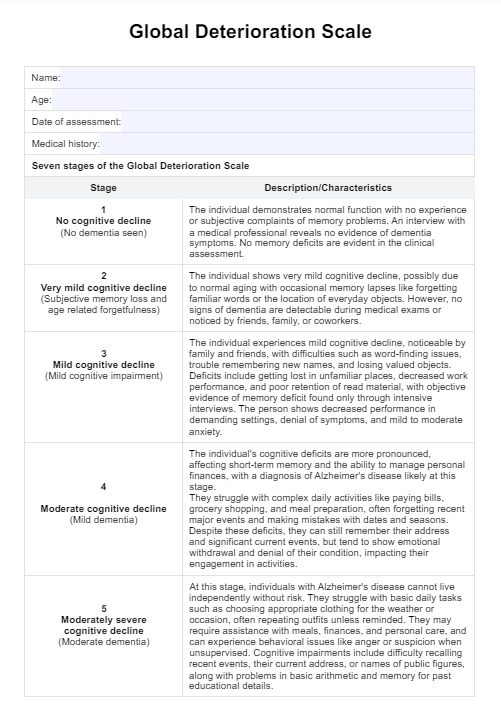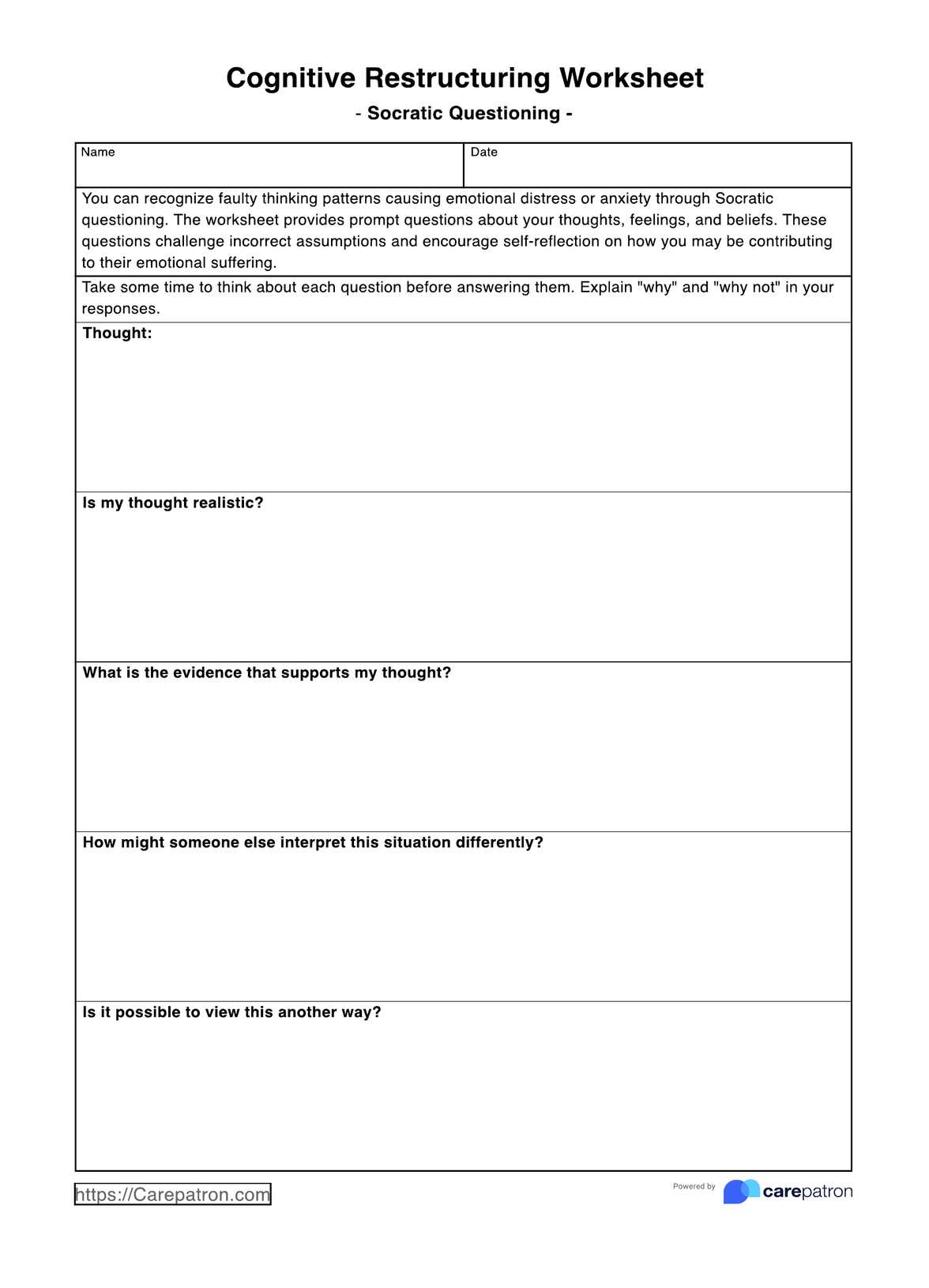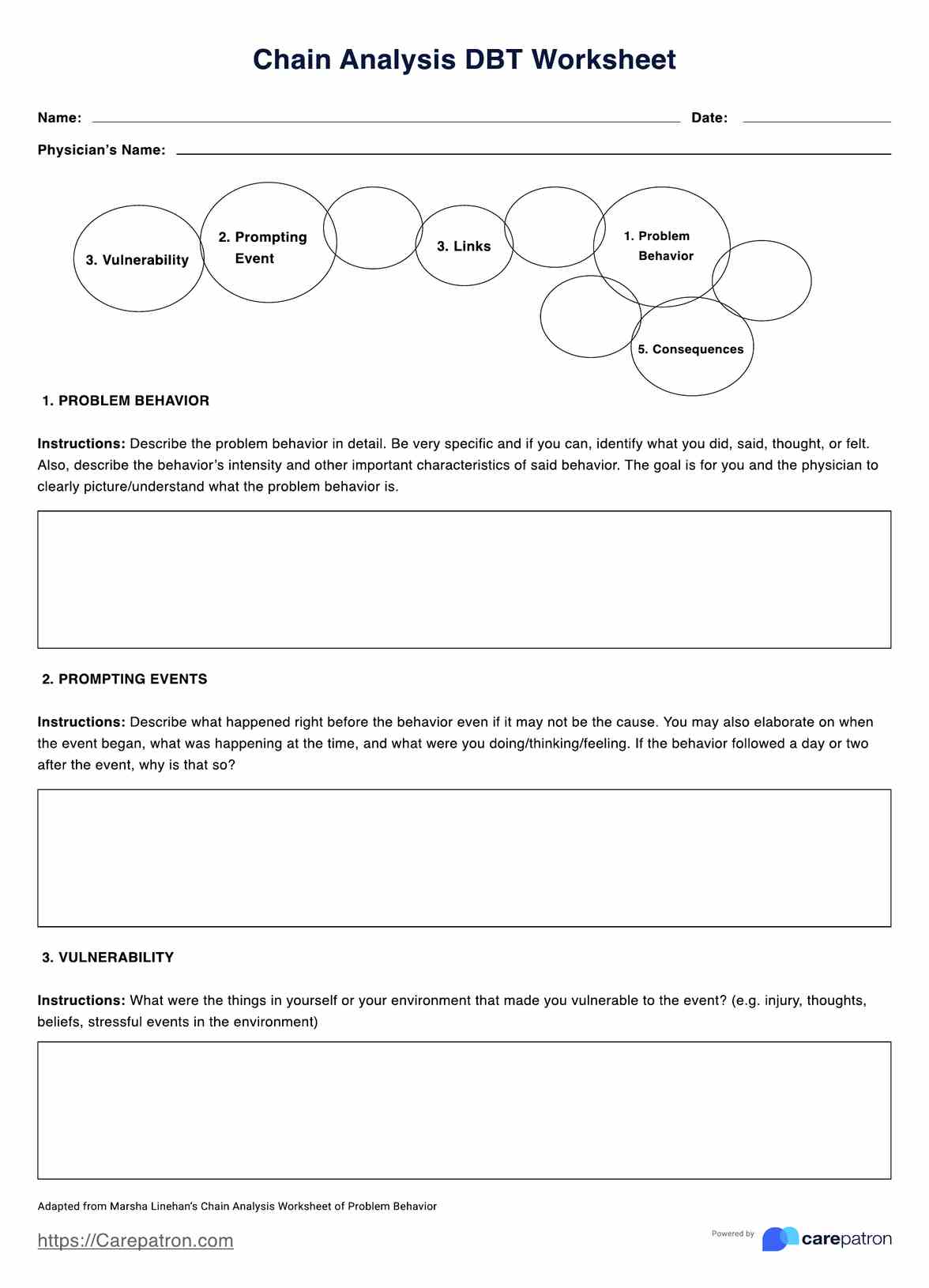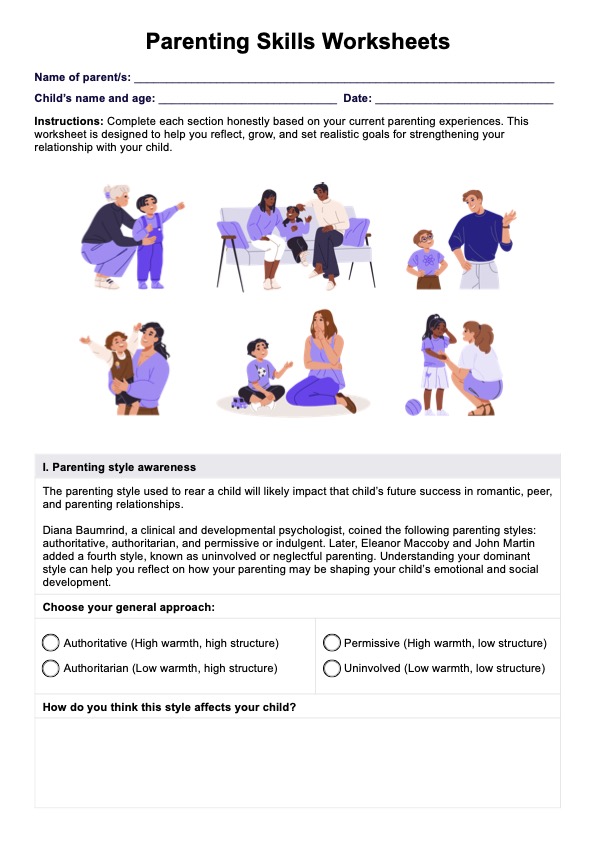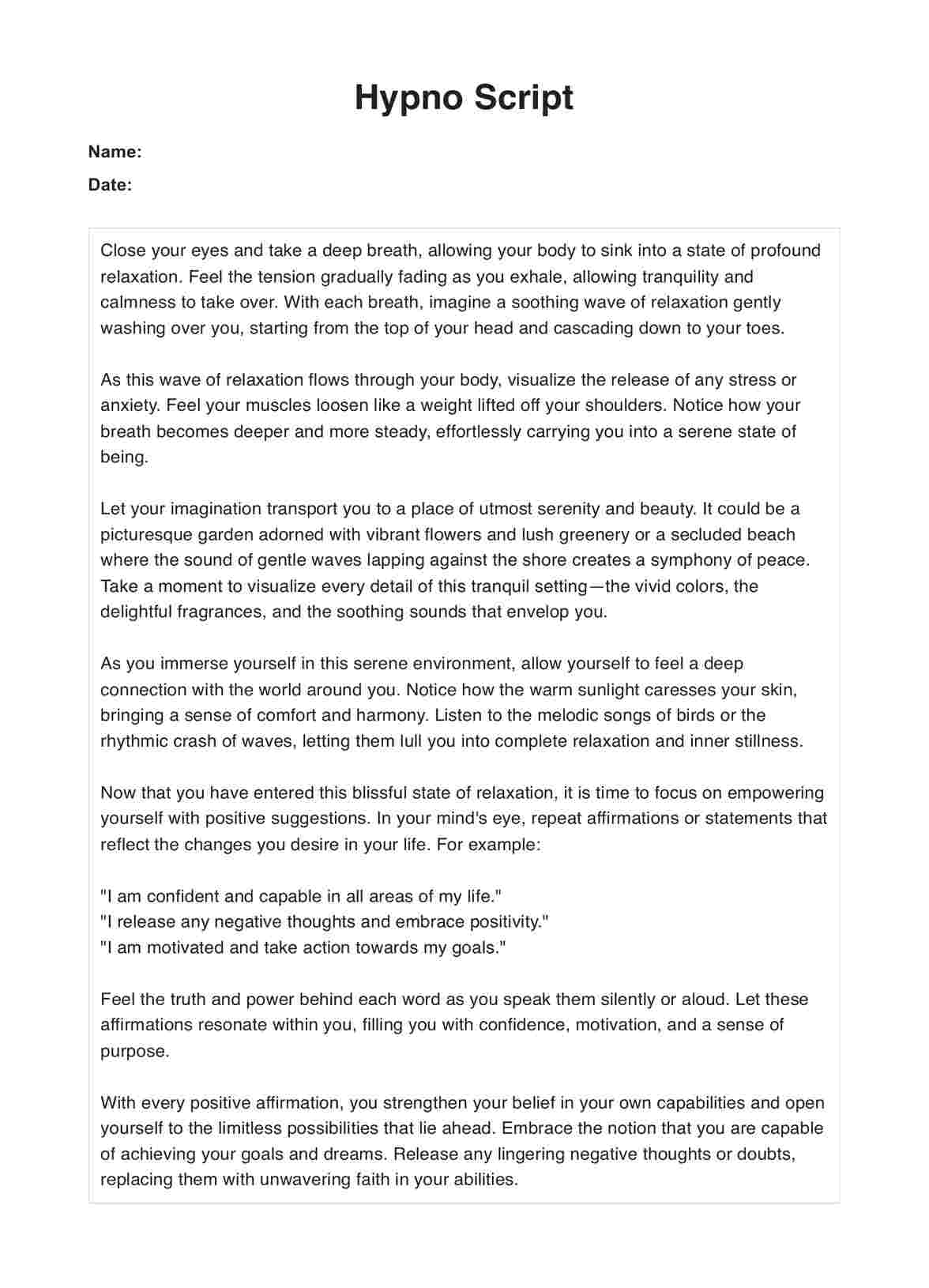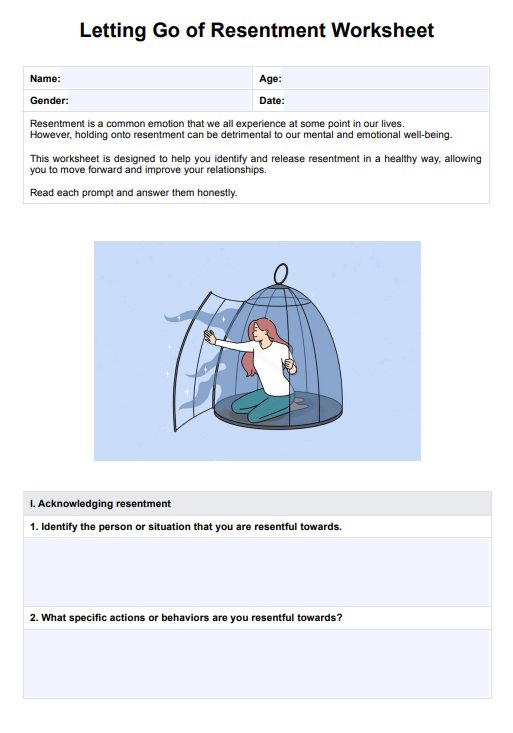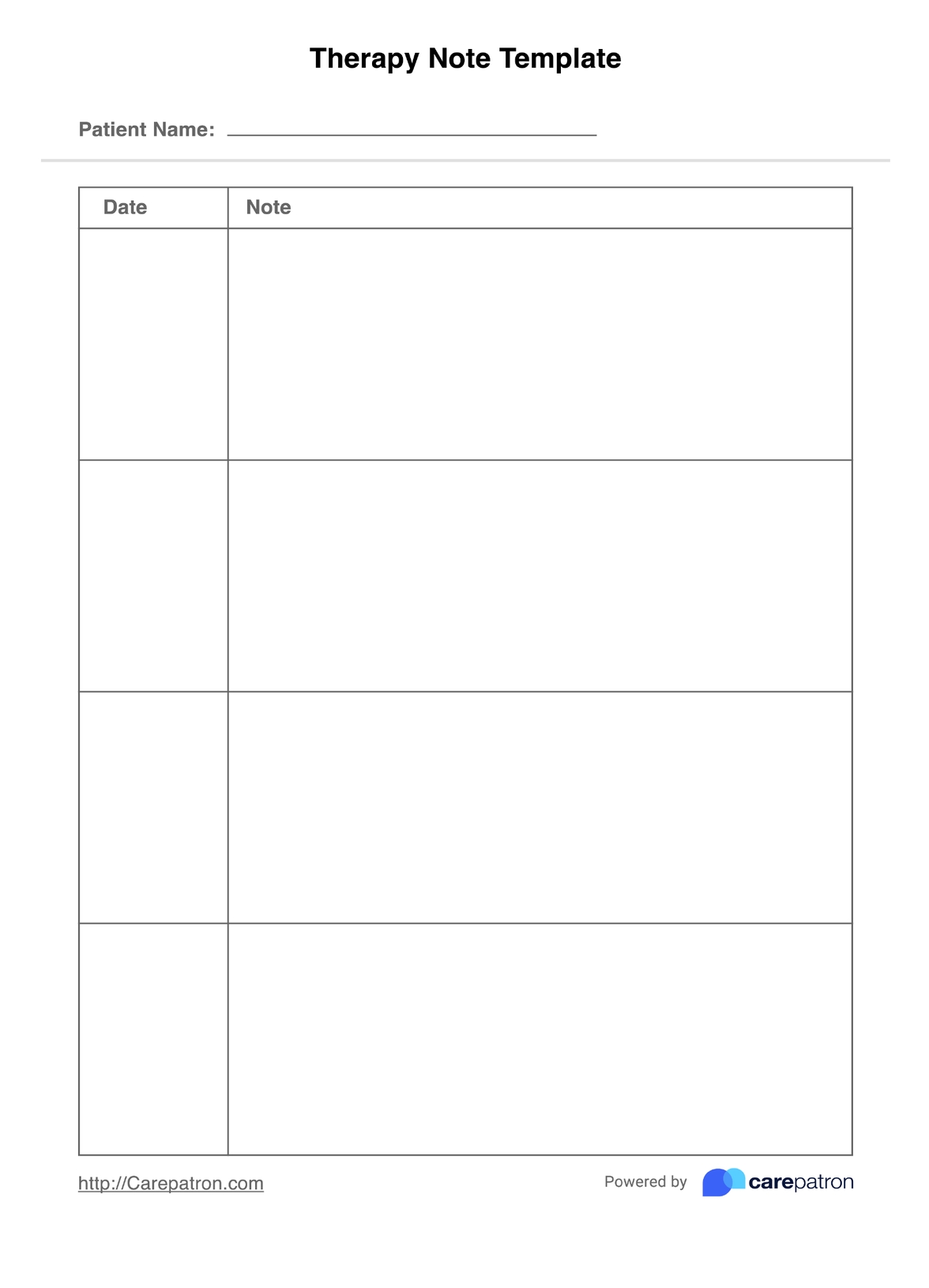Therapeutic Interventions List
Explore a comprehensive guide offering diverse therapeutic interventions to address various challenges and enhance mental health and well-being.


What are therapeutic interventions?
Therapeutic interventions encompass a broad spectrum of techniques, strategies, and approaches employed in clinical settings to address individuals' various mental health, physical, emotional, or developmental challenges. These interventions promote healing, enhance well-being, improve functioning, and facilitate personal growth.
Within the mental health context, therapeutic interventions involve psychotherapeutic techniques delivered by trained professionals such as psychologists, counselors, or therapists. These interventions encompass cognitive-behavioral therapy (CBT), dialectical behavior therapy (DBT), psychodynamic therapy, and mindfulness-based approaches. The therapies involve structured sessions where individuals explore thoughts, emotions, and behaviors to gain insight, develop coping skills, and effect positive life changes. Therapists may use talk therapy, breathing techniques, behavioral interventions, relaxation techniques, and role-playing exercises to address specific concerns like anxiety, depression, trauma, or relationship issues.
Physical rehabilitation interventions focus on improving functional abilities, mobility, and physical health. These may include physiotherapy, occupational therapy, and speech therapy. Physiotherapy emphasizes exercises, stretches, and movements to restore strength and mobility and reduce pain after injuries or surgeries. Occupational therapy aims to improve independence in daily activities through exercises targeting fine motor skills, sensory integration, or adaptive techniques. Speech therapy enhances communication skills, language development, and swallowing abilities in individuals with speech or language disorders.
Child and developmental interventions cater to children's unique needs and may involve play therapy, art therapy, or behavioral interventions. Play therapy utilizes play-based activities to help children express emotions, solve problems, and develop coping skills. Art therapy encourages creative expression to explore feelings, enhance self-awareness, and address emotional challenges. Behavioral interventions employ reinforcement, modeling, and social skills training to support children with developmental or behavioral disorders.
Other interventions include pharmacotherapy, group therapy, family therapy, and holistic approaches such as yoga, meditation, or mindfulness. These interventions can be tailored to individual needs, offering a safe space for exploration, support for self-harm, skill-building, and fostering resilience.
Therapeutic interventions encompass many methods and practices, each designed to address individuals' specific challenges. They provide a structured and supportive environment for healing, growth, and improving the patient's condition and overall well-being across various domains of health and functioning.
Therapeutic Interventions List Template
Therapeutic Interventions List Example
When are therapeutic interventions required?
Therapeutic interventions are necessary in various situations and for diverse reasons, often when individuals encounter challenges that impact their mental, emotional, physical, or relational well-being.
Mental Health Concerns
Therapeutic interventions are often necessary when individuals face mental health issues such as anxiety disorders, depression, trauma, or mood disorders. These interventions offer support, coping strategies, and tools to manage symptoms, improve mental health, and enhance overall cognitive functioning.
Behavioral or Developmental Challenges
Children or adults experiencing behavioral difficulties, developmental delays, learning disabilities, or attention-deficit/hyperactivity disorder (ADHD) might benefit from therapeutic interventions designed to address these specific challenges.
Life Transitions or Stressful Situations
During significant life changes such as divorce, loss of a loved one, career transitions, or major stressors, individuals might seek therapy to navigate these changes, manage stress, and cope with associated difficult emotions.
Relationship or Family Issues
Therapeutic interventions like couples therapy, family therapy, or mediation are sought when relationships face conflicts, communication breakdowns, stress management, or when families need support in resolving issues or improving dynamics.
Physical Health Conditions or Disabilities
Individuals recovering from injuries, or surgeries, or living with chronic illnesses or disabilities may require physical rehabilitation, occupational therapy, or pain management interventions to restore functionality and improve quality of life.
Personal Growth and Self-Exploration
Some seek therapy or counseling for personal growth, self-exploration, or to enhance self-awareness, seeking a better understanding of themselves, their behaviors, or their relationships.
Addiction or Substance Use Issues
Therapeutic interventions play a pivotal role in addiction recovery by providing support, counseling, and tools to manage cravings, cope with triggers, and maintain sobriety.
Examples of therapeutic interventions
Therapeutic interventions encompass a wide range of approaches tailored to address various mental, emotional, physical, and relational challenges individuals may face. Here are some specific examples across different modalities and their respective guides and free resources from Carepatron.
- Cognitive-Behavioral Therapy (CBT): CBT focuses on identifying and modifying negative thought patterns and behaviors contributing to mental health issues like anxiety or depression. It involves restructuring thoughts, practicing relaxation techniques, and implementing behavioral strategies.
- https://www.carepatron.com/templates/cbt-therapy-worksheet
- Dialectical Behavior Therapy (DBT): DBT is effective for managing intense emotions, often used in treating borderline personality disorder. It includes mindfulness practices, emotion regulation, distress tolerance, and interpersonal effectiveness skills.
- https://www.carepatron.com/templates/dbt-therapy-worksheet
- Play Therapy: Primarily used for children, play therapy allows them to express emotions, work through trauma, or explore feelings through play-based activities guided by a therapist.
- https://www.carepatron.com/guides/play-therapy
- Art Therapy: Engaging in artistic expression helps individuals explore emotions, reduce stress, and enhance self-awareness. Art therapy involves creating art as a means of communication and self-discovery.
- https://www.carepatron.com/templates/art-therapy-worksheets
- Family Therapy: This approach involves multiple family members in therapy sessions to address communication breakdowns, conflicts, or relational issues. It aims to improve understanding and dynamics within the family unit.
- https://www.carepatron.com/blog/family-therapy-worksheet-examples-2023
- Mindfulness-Based Stress Reduction (MBSR): MBSR uses mindfulness meditation and yoga to reduce stress, improve focus, and promote overall well-being. It's beneficial for managing anxiety, chronic pain, or other stress-related issues.
- https://www.carepatron.com/guides/mindfulness-meditation
- Occupational Therapy: Occupational therapists assist individuals in improving daily living skills, fine motor abilities, sensory integration, and adaptive techniques for increased independence in daily activities.
- https://www.carepatron.com/guides/occupational-therapy
- Physical Therapy: Physical therapists focus on restoring mobility, strength, and function through exercises, stretches, and other interventions for individuals recovering from injuries, surgeries, or living with disabilities.
- https://www.carepatron.com/guides/neurological-physical-therapy
- Group Therapy: Group settings facilitate interaction and support among individuals facing similar challenges, offering a space to share experiences, learn coping strategies, and receive peer support.
- https://www.carepatron.com/guides/group-therapy-activities
- Psychodynamic Therapy: This therapy delves into unconscious thoughts and early life experiences to gain insight into current behavior patterns, often exploring deep-seated issues and conflicts.
- https://www.carepatron.com/guides/psychodynamic-therapy-techniques
How to effectively use this therapeutic intervention list
Understanding Needs
Identify the specific needs or challenges you or others are facing. This helps in selecting appropriate interventions from the list.
Consultation
If applicable, consult with a professional (therapist, counselor, or healthcare provider) to discuss which interventions align best with the identified needs.
Tailoring Interventions
Customize the interventions to fit individual preferences, circumstances, and goals. Consider factors such as personal comfort, accessibility, and suitability.
Implementing Consistently
Incorporate the chosen interventions into your routine or schedule them regularly. Consistency is key to seeing the benefits.
Adjustment and Adaptation
Be flexible and willing to modify or explore new interventions if needed. Not all interventions work the same for everyone, so adapt as necessary.
Seeking Professional Guidance
For complex issues or severe conditions, consult professionals to ensure proper guidance and support in utilizing interventions effectively.
It is important to remember that a therapeutic interventions list is a resource to guide and support your efforts in addressing specific concerns or enhancing well-being. It should be utilized thoughtfully, considering individual needs and preferences, and can serve as a starting point for seeking appropriate interventions or professional assistance with treatment goals.
Benefits of knowing different therapeutic interventions
Understanding various therapeutic interventions offers several benefits. Firstly, it expands your toolkit for addressing diverse challenges, whether they're mental, emotional, physical, or relational. This knowledge enables tailored approaches, allowing you to select interventions that resonate and align with specific needs.
It fosters personal empowerment by identifying triggers and offering options for self-care, coping strategies, and potential solutions. Additionally, being acquainted with different interventions promotes flexibility and adaptability in managing various situations, enhancing resilience, communication training, and overall well-being. It also facilitates informed conversations with professionals, empowering collaborative efforts towards improved mental health and better life outcomes.
When therapeutic interventions are incorporated into progress notes, depth and context are added to the documentation process within therapy or counseling sessions. Here's an easy overview of its benefits:
Tracking Client Progress
Progress notes detailing specific interventions used in sessions offer a comprehensive overview of a client's journey. They help track improvements, setbacks, or changes in symptoms, behaviors, or emotions over time. This tracking is vital for assessing the effectiveness of interventions and adjusting treatment plans accordingly.
Documentation of Strategies
Notes that detail the interventions applied during sessions serve as a reference for therapists, ensuring they remember and replicate effective techniques. This documentation aids in consistency across sessions and helps therapists avoid repeating unsuccessful approaches.
Client-Centered Approach
Recording interventions demonstrate a client-centered approach, showing that therapy is tailored to individual needs. It highlights the efforts made to address specific challenges or goals set collaboratively with the client.
Facilitating Collaboration
Progress notes are essential for facilitating collaboration among multidisciplinary teams. They provide insights into the therapeutic approach, interventions, progress, and challenges faced, enabling a cohesive and informed approach to client care.
Legal and Ethical Compliance
Comprehensive progress notes serve as legal and ethical documentation, outlining the care provided, the rationale behind interventions, and ensuring compliance with professional standards and regulations.
Effective Communication
Detailed notes aid in effective communication between therapists, supervisors, or other healthcare professionals involved in the client's care. They convey the client's progress, the effectiveness of interventions, and any adjustments made to the treatment plan.
Evaluation and Decision-Making
Reviewing interventions documented in progress notes helps therapists assess what strategies are most effective for specific clients. This evaluation guides decision-making, allowing therapists to refine interventions, set new goals, or adapt treatment plans to better suit the client's needs.
Implementing therapeutic interventions within progress notes
Implementing therapeutic interventions within mental health progress notes offers numerous benefits. It serves as a documented record of the strategies, techniques, or treatments employed during therapy sessions, aiding in continuity of care. These notes provide a comprehensive overview of the client's progress, allowing therapists to track the effectiveness of interventions, observe patterns, and make informed decisions for ongoing treatment. Additionally, it enhances communication among multidisciplinary teams, ensuring a cohesive approach to client care. Documenting interventions fosters accountability, enabling therapists to evaluate what works best for individual clients and make necessary adjustments for optimal therapeutic outcomes. Overall, incorporating interventions within client progress notes is integral to effective treatment planning, evaluation, and the provision of quality care.
some keywords that practitioners may use in their patient's progress and notes relating to interventions include, yet aren't limited to:
- Acknowledged
- Affirmed
- Collaborated
- De-escalated
- Demonstrated
- Facilitated
- Reflected
- Set boundaries
- Validated
Commonly asked questions
Finding the right intervention involves considering your specific needs, and preferences, and the guidance of a professional. Exploring different options and discussing them with a therapist or counselor can help identify the most suitable approach.
The timeline for seeing results varies based on individual circumstances, the nature of the issue, and the chosen intervention. Some people experience improvements early on, while others might take longer. Consistency and commitment to the intervention often influence the speed of progress.
Yes, combining interventions can be beneficial. Therapists often employ an integrative approach, combining various techniques tailored to individual needs. This approach maximizes effectiveness by addressing multiple aspects of the issue and accommodating different preferences or responses to treatment.


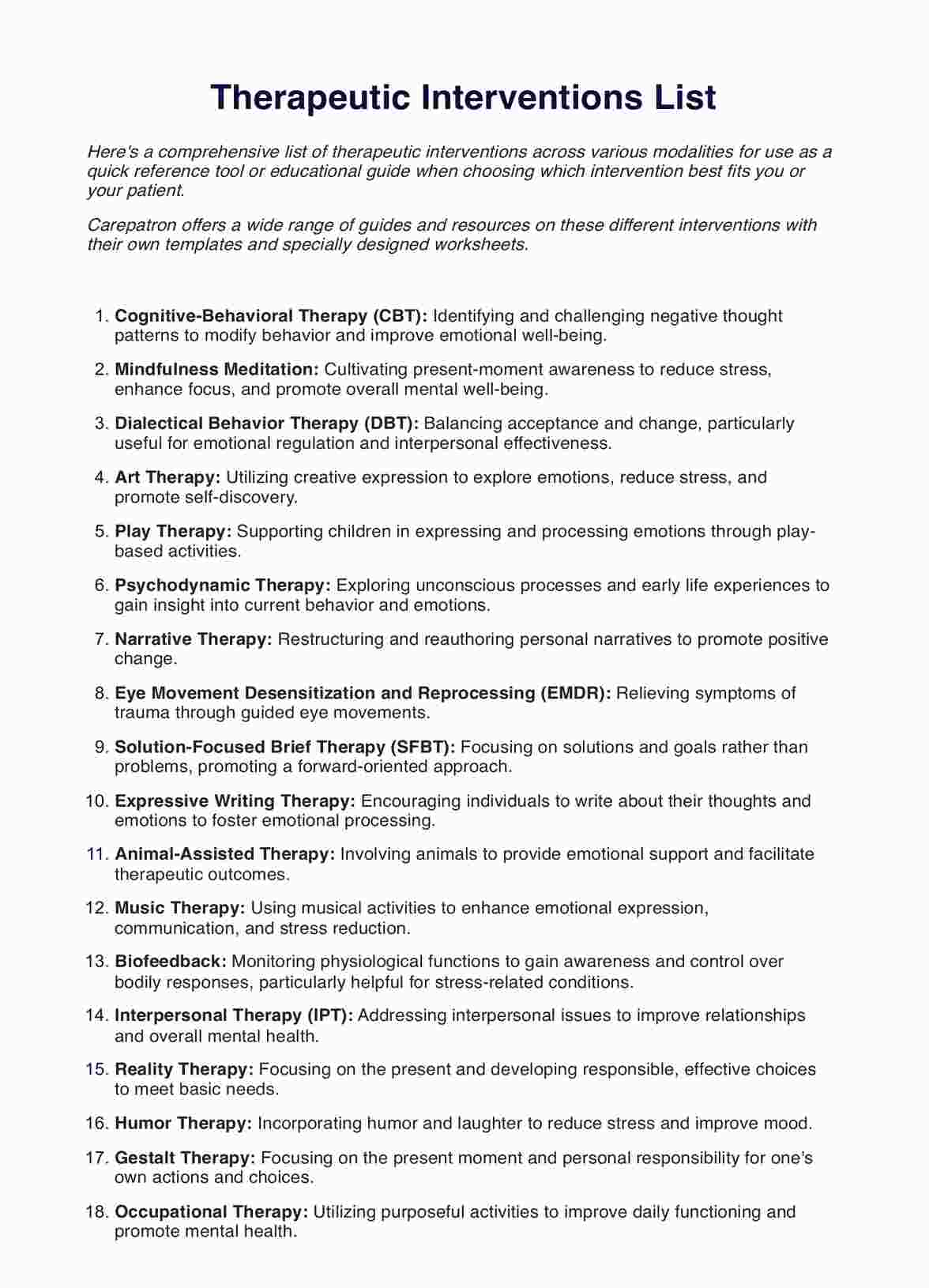
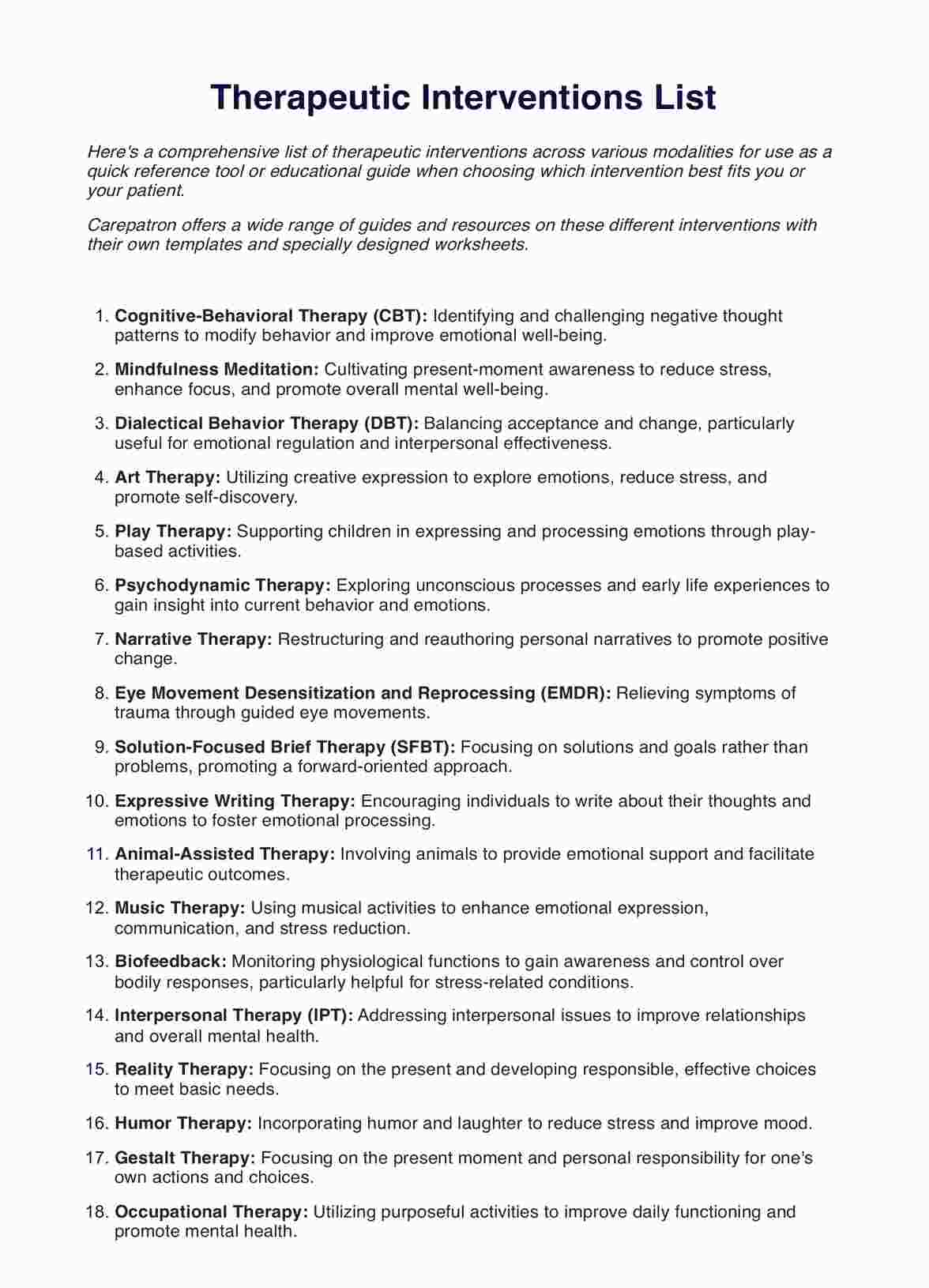


















-template.jpg)



















































































